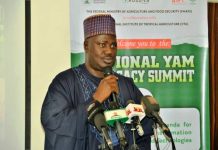
In order to achieve the vision of the present administration in the area of food security, the Federal Ministry of Budget and Planning has sought the cooperation of all the 18 States in the southern part of the country in achieving a robust implementation of the food systems transformation pathways in Nigeria.
This was made known by the Permanent Secretary, Budget and Planning, Federal Ministry of Finance, Budget and National Planning, Engr. Nebeolisa Anako while speaking during a Consultation Workshop on harvesting inputs from all the Southern States towards the development of a robust and inclusive Implementation Strategy for the Food System Transformation Pathways in Nigeria held in Awka on Thursday.
According to the Permanent Secretary who was represented by his P.A Engr. Okechukwu Ezekwesili, the Southern Zonal Consultation is imperative for all States in South, and relevant stakeholders, especially state actors in the Food System Value Chain in order to guarantee an inclusive and jointly-owned implementation Strategy.
Anako stated that the Food System Transformation Agenda is not a Federal Government programme, but one that calls for concerted efforts of everyone, including the states, local government, private sector, development partners and the citizens, considering the fact that food security remains critical to human survival.
The Permanent Secretary added that the implementation of the food systems transformation pathways requires a multi-stakeholder approach and engagement at all levels to ensure that its objectives of promoting health and nutrition, reducing greenhouse gas emissions, and enhancing socio-economic development in Nigeria are achieved.
Speaking further about the Consultation Workshop, Anako said that the Federal Government is keen about engendering inclusiveness in the implementation of the Food System Transformation Pathways in Nigeria through the development of a robust national implementation strategy.
He emphasised that the government at the sub-national level is critical to the success of the implementation of the food system Transformation Pathways, stressing that this explains the reason for holding the Consultation Workshop which is a convergence of all stakeholders in the Southern Zones.
While appreciating all participants at the workshop, the Permanent Secretary expressed the belief that the outcome of the southern zonal consultation on the development of the implementation strategy for the food systems transformation pathways will be a value addition to implementation of the Food Systems Transformation Pathways in Nigeria.
Representing the Governor of Anambra State, Professor Charles Soludo at the event, the Chief of Staff to the Governor, Mr. Ernest Ezeajughi, pleaded with the representatives of all States in the southern part of the country at the Consultation Workshop, to embrace the initiative and make its implementation seamless for the federal government.
He disclosed that Agriculture occupies a prime place in the Five pillars of his administration, revealing that the vision of Anambra State is to become one of the States that would be referred to as the food basket of the nation before the end of his tenure.
The Governor stated that he accepted to host the Consultation Workshop as a form of demonstration of his commitment to the transformation of the food system in Nigeria and also determination to ensure a healthy diet and food security for the people of Anambra State.
In her remarks, the Anambra State Commissioner for Budget and Economic Planning, Ms. Chiamaka Nnake, opined that the need for a workshop of this nature cannot be over emphasized considering its impact on the economy and ability to solve social deprivation issues such as hunger, malnutrition, diseases etc.
She added that Anambra State understands the critical role that food systems can play in supporting the growth of the country’s economy and the livelihood of Ndi-Anambra in order to leverage on the strengths and opportunities that exist within the State’s agriculture and agro-processing sectors.
The Commissioner thanked the Federal Ministry of Budget and National Planning for the proactive approach to the 78 priority actions presented by President Muhammed Buhari, GCFR at the UN Food Systems Summit in New York in September 2021 in ensuring that the task Team comprising of donors/development partners, private sector and other relevant stakeholders work tirelessly to produce a robust implementation strategy.
In a presentation tagged “Overview of the Food Systems Transformation Pathways in Nigeria: The Journey So Far”. The National Convenor UN Food Systems and also the director of Social Development of FMBNP, Dr. Sanjo Faniran, affirmed that Food systems transformation is non-negotiable for progress and development in Nigeria.
According to the National Convenor, the Pathway towards significant transformations of the Nigeria food system requires Smart partnership and strong political will, Right polices, governance and business models.
In his words, “To achieve a food system that is inclusive, efficient, resilient, and sustainable to deliver quality diet and livelihood, all stakeholders have to play their role effectively and in collaboration with other stakeholders.”
Among the Goodwill messages at the event, the Representative for Food and Agriculture Organization, FAO, in Nigeria and to ECOWAS, Fred Kafeero, averred that the Nigerian Government, since the beginning of 2022, has shown commendable efforts in implementing the Post Food Systems Summit Resolutions through the National Convener for Food Systems Transformation office.
He said that the United Nations recognizes and appreciates these efforts, which have included national level dialogues in 2021 and zonal sensitization workshops in five coordinating states and the Federal Capital Territory (FCT). These initiatives aim to ensure that all states and stakeholders understand their roles and contributions to the Food Systems Transformation Pathways Implementation in Nigeria.
He informed that FAO has been providing technical assistance to the Nigerian government to effectively implement agrifood systems interventions, saying that the School Garden for Better Nutrition in the FCT is one of the projects piloted by FAO in collaboration with the Federal Ministry of Agriculture and Rural Development (FMARD).
He promised that FAO will continue to focus on synergy with the Federal and State Ministries to drive the necessary change in the Nigerian food systems as a whole.
Olude Omolade
Principal Information Officer
For: Director, Information (BNP)





